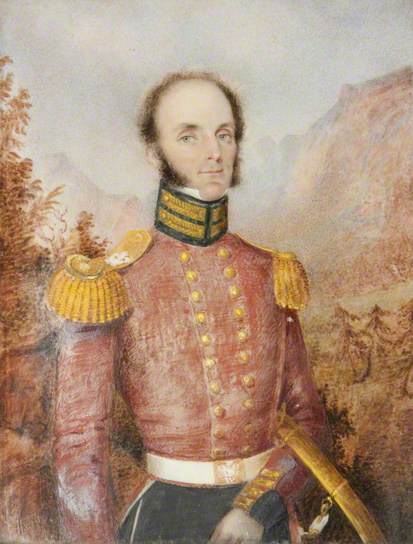HOME
Museum &
Collections
Sales
Donations
Events
Contact Us
REGIMENTAL HISTORY
17th Century
18th Century
19th Century
20th Century
First World War
Second World War
Actions & Movements
Battle Honours
FAMILY HISTORY
Resources
Further Reading
PHOTO GALLERY
ENQUIRIES
FURTHER READING
LINKS


|
|
Soldiers of the King's Own Regiment
Colonel Henry William Breton

Colonel Henry William Breton, 4th Regiment of Foot, the King’s Own,
circa 1830, painted by P A Barnard.
Breton was commissioned as an Ensign in 1815 and served with the King’s
Own in the West Indies (1821-6), Portugal (1826-7), and sailed to
Australia on the ‘William Glen Anderson’ on 14th May 1931 serving in Van
Diemen’s Land, Parramatta and Goulburn Plains. Breton was promoted
Colonel and commanded the regiment from 1834 at Parramatta and Sydney and
then in India at Madras, Bangalore, Bellary,
Secunderabad
and Kamptee. He
later rose to the rank of General and became Colonel of the 56th Regiment
in 1854. He died at the age of 91 in 1889.
KO1391/01 Purchased with grant aid from the Army Museums
Ogilby Trust.
Some of
Colonel Breton's Views
The following is reproduced from an unknown
source held in the museum's collection recording some of the views of
Lieutenant Colonel Breton, 4th Foot whilst in command of the Regiment in
New South Wales:
 |
Almost amalgamated
with convicts as soldiers are in New South Wales, irksome and
harassing as are their duties, it requires the most unremitting care
on the part of the commanding officer to keep even common order in
his regiment. With proper defaulters’-rooms, and means of hard
labour, he may do much, but new barracks must be first built.
|
 |
Hard labour, as
inflicted in New South Wales, is utterly ruinous to the discipline
of a regiment, the soldier being compelled, either in the hulks or
at Norfolk Island, to herd with the greatest villains possible. At
the expiration of a term at Norfolk Island the man should be
discharged the service. Approves of solitary confinement.
|
 |
From one to six
months. When a man is sent away for a long time from his own corps,
he thinks himself forgotten, and becomes callous or heart-broken,
and either way becomes bad. |
 |
Temperance societies
might be established, but that is impossible while the men receive
spirits as a part of their ration. Far more is to be gained by
example among the officers. He has discouraged the commemoration of
particular days, and does not allow cheering at the mess table.
“What must follow a great mess dinner in the centre of a barrack?
The men will surely reason upon the conduct of their officers, and
wonder why they also should not be allowed to enjoy themselves.”
|
 |
The man in solitary
confinement should be allowed his great-coat and no bed, and his
food should be bread and milk. Hard labour should, as far as
practicable, be in view of the regiment, such as cleaning drains,
forming a regimental garden, and cleaning and washing the barracks.
Cannot, however, call to mind, during twenty years’ service in the
same regiment, more than two or three cases of permanent reform, and
these had no reference to any particular system of management.
|
Only a proportion of our collections
are on display at anyone time. Certain items are on loan for display
in other institutions. An appointment is required to consult any of
our collections which are held in store. |


